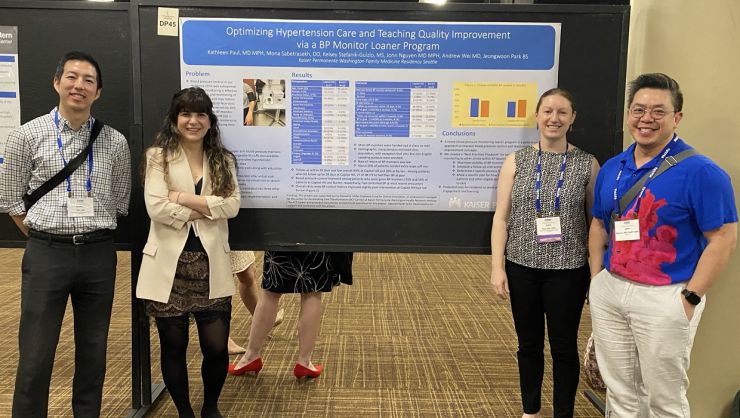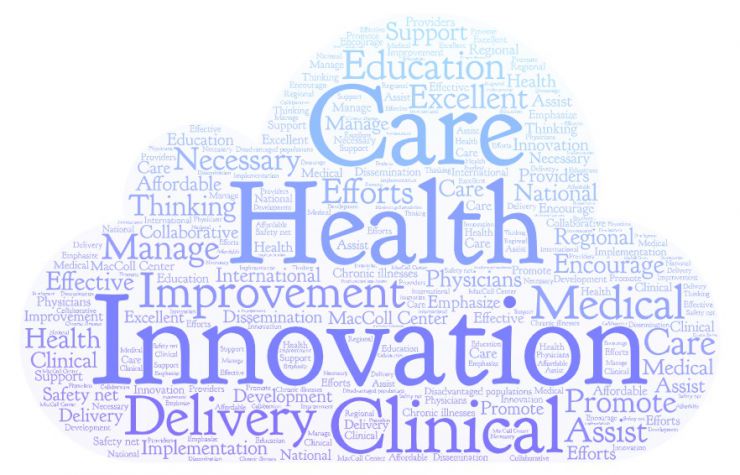Endowments support equity in hypertension care at Kaiser Permanente Washington

Team members from the Kaiser Permanente Washington Residency Program (L-R): Andrew Wei, MD; Mona Sabetrasekh, DO; Katie Paul, MD, MPH; and John Nguyen, MD, MPH, with the poster they presented at the Society for Teachers in Family Medicine conference in May.
How the ACT Center is leveraging its endowment funds and research expertise to improve access to home blood pressure monitors
By Kelsey Stefanik-Guizlo, MPH, a collaborative scientist with the Center for Accelerating Care Transformation (ACT Center) at Kaiser Permanente Washington Health Research Institute
Effective management of hypertension, also known as high blood pressure, is essential to preventing serious complications such as heart disease, stroke, and chronic kidney disease. However, there are differences in blood pressure control by racial group both nationally and at Kaiser Permanente Washington, with people of color having lower rates of control compared to white people. Research has shown that home blood pressure monitoring works well to diagnose and monitor hypertension and may reduce the need for face-to-face visits. But using home blood pressure monitors can pose significant barriers for many people, including the cost of buying one.
Since January 2023, Kaiser Permanente Washington’s Center for Accelerating Care Transformation (ACT Center) and Family Medicine Residency Program have been partnering on a quality improvement project to improve blood pressure control and address disparities across different patient groups. The project provides loaner blood pressure monitors to members to help them track their blood pressure at home. This work is supported by the Donald G. Miller, MD, Endowed Fund for Clinical Innovation, which was established to promote innovation in the delivery of health care at Kaiser Permanente Washington.
The Miller Fund is one of several endowments that the ACT Center is proud to steward to support clinical innovation and improvements in health care delivery. By leveraging our scientific expertise, we’ve been able to support promising projects with more than just funding. We also provide infrastructure and tailored technical assistance to help our partners develop evidence-based approaches to improve care, rapidly evaluate their programs, and implement improvements in a sustainable way. The strong relationship we’ve built with the residency program has paved the way for launching other endowment-funded projects to improve health equity within Kaiser Permanente Washington.
How the initial project expanded after promising early results
It all started with a residency program pilot supported by the Miller Fund. Katie Paul, MD, MPH, who oversees the residency program’s quality improvement curriculum, led a team of residents in planning and implementing a project that distributed home blood pressure monitors to 100 Kaiser Permanente Washington members. Recognizing that access to a home monitor was only one piece of the puzzle, the pilot also focused on teaching members how to use the monitors, encouraging providers to follow up with recipients within 30 days to check in on blood pressure control, and improving documentation of blood pressure readings in the electronic health record.
Katie and her team presented preliminary results from the project in May at the Society of Teachers of Family Medicine annual conference in Los Angeles. They observed promising trends toward improved blood pressure control among members who received a home blood pressure monitor. The project team also identified areas for improvement, including reaching people who speak languages other than English.
Inspired to build on their initial work, the residency program decided to continue the project in 2024. They are distributing 110 additional home blood pressure monitors and conducting quality improvement cycles focused on program reach and implementation. Here’s a summary of the progress so far:
- A total of 150 monitors have been given out to members.
- The team is exploring ways to reach patients who speak a language other than English or who aren’t already coming in for visits (either in person or virtually).
- Residents are developing ways to proactively reach out to patients with high blood pressure about getting a home monitor.
How the project informed additional hypertension projects
Given promising early results from the residency program project and ongoing interest in improving blood pressure disparities at Kaiser Permanente Washington, the ACT Center is funding a new project initiated by the Kaiser Permanente Washington Equity, Inclusion, and Diversity team. The project will focus on addressing hypertension disparities in Black and African American members through a loaner program for blood pressure monitors. We are pleased to be able to support this important work through the Robin E. Johnson Endowed Fund, which aims to help improve the delivery of health care for Kaiser Permanente Washington members and residents of Washington state.
The project team is leveraging the learnings and tools from the residency program’s work as they develop their program. To start, they are collaborating with a team of nurses, a primary care provider, and a medical assistant, and they plan to recruit 2 patient partners to serve as advisers.
This work feels especially timely and important given that Kaiser Permanente Washington has prioritized improving hypertension outcomes for all members. The 2 project teams get together monthly to discuss highlights and successes, troubleshoot challenges, and capture lessons learned to share with others doing similar work. By leveraging the ACT Center’s scientific expertise on both projects, we hope to improve health care and health equity for our members in a way that’s both pragmatic and evidence based.
What’s next?
The ACT Center looks forward to partnering with both teams to evaluate and report on the impact these projects have on clinic and organizational equity metrics. We are continuing to meet regularly with the project teams to help them elevate successes and overcome challenges.
Momentum from these projects has also inspired new partnerships. ACT Center team members and residency program faculty recently identified an immediate opportunity for the ACT Center to consult on the design of a program evaluation for the Orion Center Clinic, which is staffed by Kaiser Permanente Washington residents and provides health services to young people ages 12 to 24 who are experiencing homelessness or unstably housed.
It’s exciting to think about where this work will lead, and we’re so grateful for the generous donors who’ve made it possible to support equity-focused clinical innovation with endowment funds. There’s still a lot of work to be done, and we’re eager to explore future opportunities to partner on projects that have potential to reduce disparities in care at Kaiser Permanente Washington and beyond.
We are grateful to the following project partners for their collaboration and hard work:
- Kaiser Permanente Washington Family Medicine Residency Program
- Katie Paul (project lead)
- John Nguyen
- Jeongwoon Park
- Mona Sabetrasekh
- Andrew Wei
- Kaiser Permanente Washington Equity, Inclusion, and Diversity Project Team
- Elizabeth Slye (project lead)
- Kristin Conn
- Zandy Harlin
- Gladys Risling
- Orion Clinic
- Joy Thurman-Nguyen (project lead)
- Anusha Sulladmath


